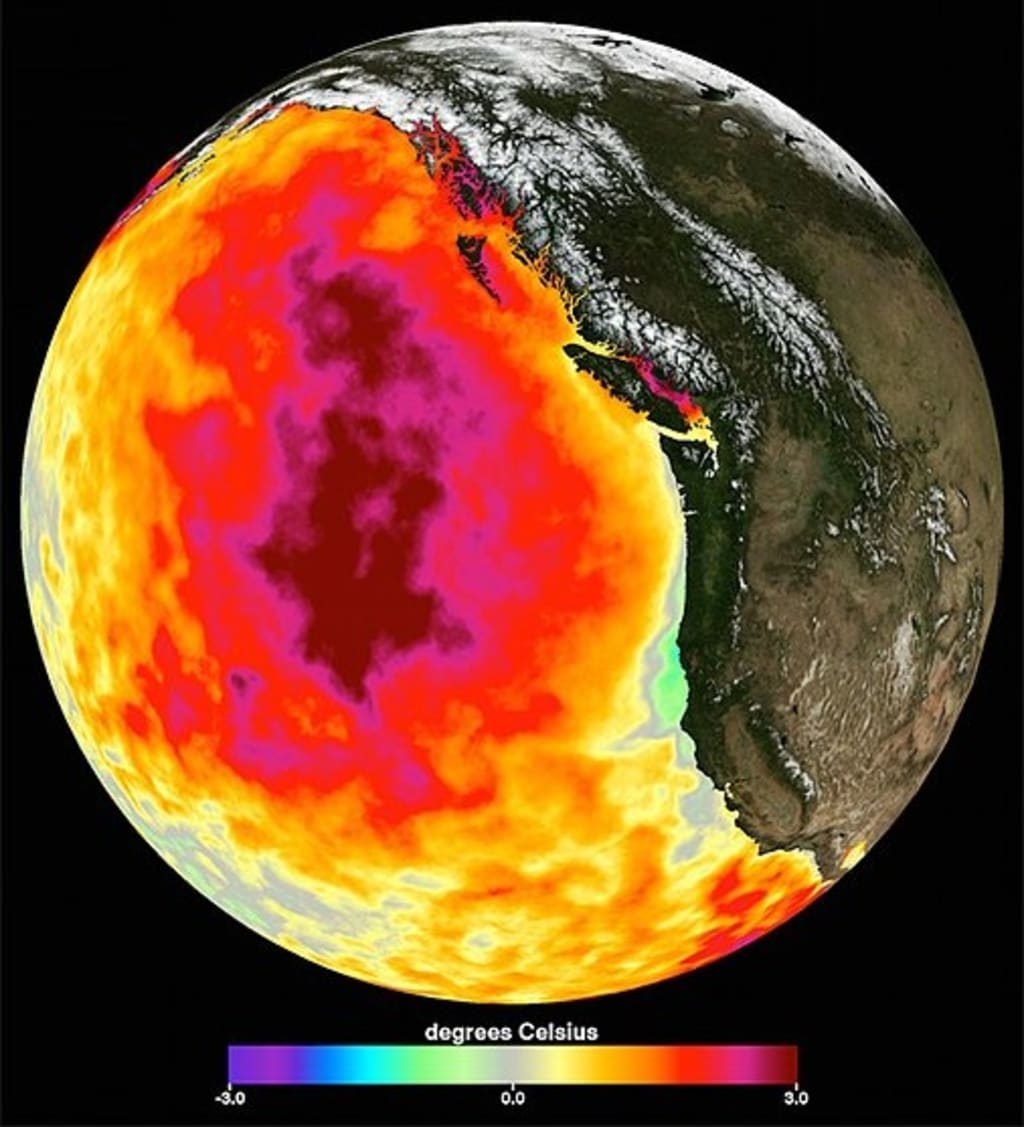Understanding Marine Heatwaves
A look at the current trends in and around the U.K. and Ireland and why we may all be affected.

Marine heatwaves are periods of persistent warming ocean temperatures, which can have significant impacts on marine life as well as coastal areas and economies. Science teams at NOAA’s Physical Sciences Lab are working to understand marine heatwaves and how to predict them in advance.
Today In The North Atlantic: A Marine Heatwave
Thousands of miles away, in the North Atlantic Ocean, temperatures for the last three months have been breaking records with a recorded peak on Saturday that was 0.2°C above the previous high set in 2010. That means that the ocean waters around Ireland and the United Kingdom are in the midst of the most severe marine heatwave at the moment, and meteorologists are warning the temperatures are up by as much as 4°C above normal. Scientists with the National Oceanic and Atmospheric Administration are categorizing this as a category four marine heatwave.
Potential Consequences of Drastic Marine Heatwaves
However, if we discuss the potential consequences or dangers of an intense marine heatwave in the North Atlantic, we can consider the impacts associated with such an event.
- Coral reef bleaching: High ocean temperatures can lead to coral bleaching events, where corals expel the symbiotic algae living in their tissues, causing them to turn white or pale. If prolonged or severe, this can lead to the death of corals, impacting the biodiversity and health of coral reef ecosystems.
- Changes in marine ecosystems: Marine heatwaves can disrupt the balance of marine ecosystems by affecting the distribution and abundance of various species. Some marine organisms may be better equipped to tolerate warmer waters, while others may suffer. This can lead to shifts in species ranges, altered predator-prey dynamics, and changes in the overall structure and functioning of the ecosystem.
- Fishery impacts: Marine heat waves can have significant effects on fish populations. Some commercially valuable fish species may experience changes in their abundance, migration patterns, or reproductive behaviors due to altered ocean conditions. This can impact the fishing industry, with potential economic and social consequences for coastal communities that depend on fisheries.
- Harmful algal blooms: Warm water conditions can favor the growth and proliferation of certain species of harmful algae. These harmful algal blooms can produce toxins that are detrimental to marine life, including fish, shellfish, and marine mammals. They can also have negative impacts on human health, as consumption of contaminated seafood can lead to illness.
- Ocean circulation patterns: Intense marine heatwaves can disrupt ocean circulation patterns, such as the Atlantic Meridional Overturning Circulation (AMOC), which plays a crucial role in the global climate system. Disruptions in ocean circulation can have far-reaching consequences, including altered weather patterns and impacts on the regional and global climate.

What’s Causing The Marine Heatwave In The UK/Ireland
To understand what we see as average people it’s important to understand that marine heatwaves can be caused by a variety of factors combing, including anthropogenic factors (human-caused).
Climate variability is one factor possibly contributing to the rising temperatures in the North Atlantic. Natural climate patterns, such as El Nino and La Nina events can contribute to the development of marine heatwaves. They are characterized by warming in the central and eastern equatorial Pacific Ocean regions and can result in a transfer of heat from the ocean into the atmosphere. That can trigger warmer conditions in other regions, including marine heatwaves.
Climate change is a factor possibly contributing to marine heat waves. Anthropogenic climate change, primarily driven by the increase in greenhouse gas emissions, is playing a significant role in the occurrence and intensification of marine heat waves. The accumulation of greenhouse gases in the atmosphere traps heat, leading to an overall warming of the Earth’s climate system. This warming extends to the oceans, increasing the likelihood of prolonged and extreme ocean temperature anomalies that manifest as marine heatwaves.
Ocean circulation patterns play a part in controlling the planet’s temperatures. Changes in ocean circulation patterns can contribute to the formation of marine heatwaves. Alterations in the strength or direction of ocean currents can result in the accumulation of warm water in specific regions, leading to the development of persistent heat anomalies.
Weather patterns: Atmospheric conditions and weather patterns can influence the occurrence of marine heatwaves. High-pressure systems and reduced cloud cover can enhance solar radiation absorption by the ocean, leading to increased heating of surface waters. This can further exacerbate the warming and persistence of marine heatwaves.

Conclusions
While NOAA and other institutions study the events known as marine heatwaves, there is a real effect these have on the people of this world. When an ecosystem such as the ocean gets too warm and the delicate balance isn’t maintained there is a consequence. Already, in the North Atlantic, there’s been a massive bloom of Noctiluca algae reported by fishermen that stretches 500km.
While there is little that we can do to stop arbitrary strange weather patterns that our world is capable of on its own, adding to the mess is something we can control. Global warming and our human footprint on the planet are changing the temperatures of our world. We can continue to look for new ways to curb our impression of our homeworld, and in years to come become less of a part of the problem.
We need to keep in mind that these problems aren’t just suffered by the people in and around the U.K. and Ireland. The changes in water temperatures can have an impact on the North Atlantic Current. The North Atlantic Current plays an intricate part in helping to regulate global weather as well as maintain the magnetic field of Earth. By changing the ecosystem, and continually seeing thousands of gallons of freshwater melt off from the Arctic shelf, temperature changes are causing desalinization.
By paying attention, being informed, and being mindful of what we are doing as individuals, the 8 billion of us could make a difference in the future of our planet, severe storms could diminish, megadroughts become a thing of the past, and eventually, we could help the climate stabilize.
References:
Marine Heatwaves Explained/http://www.marineheatwaves.org/all-about-mhws.html
Marine Heatwaves/https://psl.noaa.gov/marine-heatwaves/
About the Creator
Jason Ray Morton
I have always enjoyed writing and exploring new ideas, new beliefs, and the dreams that rattle around inside my head. I have enjoyed the current state of science, human progress, fantasy and existence and write about them when I can.







Comments (14)
Thanks for write this article
Please, I just wrote my article, kindly rate it for me so that I can do better. https://vocal.media/earth/blossoms-of-life-ugb09h1
Please guys rate this article for me 🙏 https://vocal.media/earth/the-bond-between-a-young-girl-and-a-polar-bear
Thanks for sharing, interesting article.
Very Informative, Good one.............
fascinating so very much read and explain
Nice work. Keep going
https://vocal.media/earth/shivaji-maharaj-s-inspiring-story
Good article & information.
good work
Congratulations on top story, very imformative
I heard someone else talking about this matter as well ❤️😉💯Great Article and Congratulations on your Top Story❗
Great article. I took a meteorology course in college as an elective years ago. I was living in Oklahoma at the time, the instructor was a meteorologist/storm chaser for the local news there. Weather fascinates me. I enjoy looking at the weather patterns all over the world on the the radar weather maps, it is quite interesting. I grew up on the ocean on the east coast of the United States (I now live in Florida, where we get what’s called red tide, which is algae in the ocean and it does wreak havoc on the sinuses), so I have nothing but respect for Mother Nature and the damage she can do. There is already a tropical storm forming in the Atlantic. Hurricane season started June 1st. With all the talk of El Niño this year, I fear Mother Nature will definitely be going a little wild with those warming ocean temperatures.
I heard from a tourist that it has been insufferable in the UK and Europe this past few weeks. I have a feeling we're going to have a taste of the same heat soon enough. Thanks for the research.